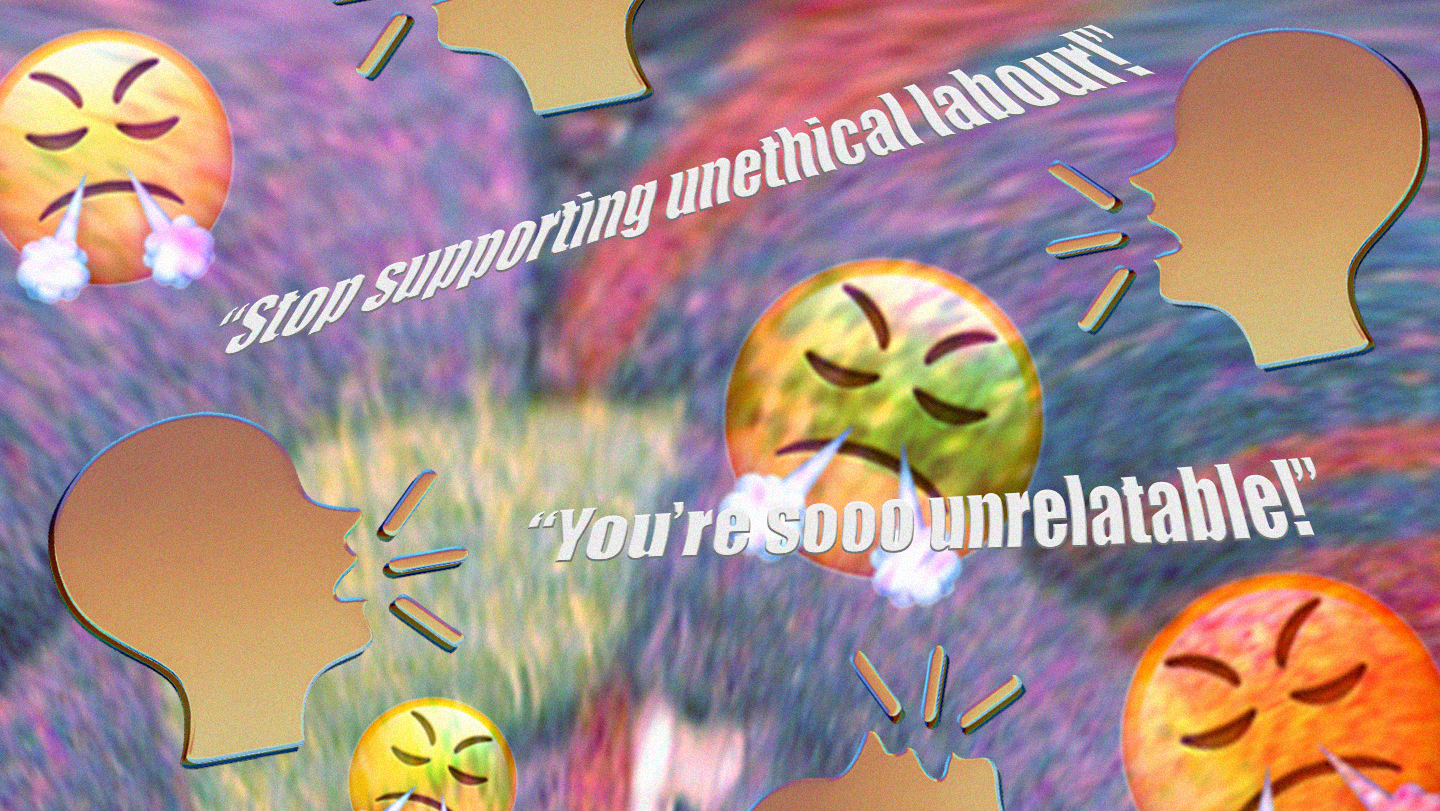Criticism is everywhere on the internet. In fact, criticism is perhaps one of the most universal online experiences there is; whether you’re a faceless burner account, a Twitter microcelebrity, or a bonafide famous person, if you’ve ever posted so much as a public comment, chances are you’ve caught some shit.
In a recent viral video, influencer Blair Walnuts explained the seemingly inescapable trap of judgement that awaits anyone who posts about their consumption online. In the eyes of a comments section, she explains, being gifted a designer purse makes you a gold-digger; buying fast fashion is unethical; buying from sustainable indie brands is unrelatable and unrealistic; thrifting takes clothes away from needier hands; making your own clothes is an unattainable standard. Obviously, some of these criticisms are fairer than others (interestingly, Blair neglected to explore the idea of simply consuming less, or not posting about consumption at all), but her video blew up for a reason: there are millions of people who are tired of not knowing what to do.
The video points to one universal truth — the denizens of the internet are, for lack of a better word, haters, often more motivated by jealousy or spite or their own personal projections than they are by reasoned or fair analysis. You will be criticised no matter what you do, often unfairly or in bad faith (particularly if you’re a public-facing woman whose job involves looking good in clothes given to you for free). There’s no denying that. But the thesis of Blair’s video — and most of its 8000+ comments — seemed to gesture at one conclusion: if we’re going to be criticised no matter what we do, why not throw up our hands and do whatever we want? The phrase “no ethical consumption under capitalism”, once a call to abolish the systems that oppress workers worldwide and trap us all in an unending cycle of exploitation and suffering, has become something more like a rallying cry for apathy — an anthem for shrugging your shoulders and adding-to-cart.
The ubiquity of online criticism has some roots in a cultural frustration with privilege and systemic injustice, which makes it somewhat ironic that it’s caused so many people to want to tune out entirely. But the idea that criticism on the internet is inescapable isn’t the end of a conversation about ethics, it’s the start of a new one. It asks: what’s going wrong? And where should we go from here?
To a viewer, it may seem ridiculous for an influencer to list “supporting unethical labour” and “being called unrelatable” as comparable offences. And, to be fair, it is ridiculous! But this example sheds light on an increasingly prevalent form of online ethics — the push to view public perception as the ultimate value system.
Every action has consequences. But for anyone who broadcasts their choices or opinions to an audience on the internet, the most tangible consequence for almost any given action is the public’s response. Fast fashion influencers can’t see the children making our clothes or the garbage islands floating in the Pacific; conservative podcasters often can’t see the material effects of their bigoted rhetoric. But all of us can see comments about everything we do — and to the recipient, those comments feel equally persecutory no matter the real-world severity of the offence.
For instance: objectively, the consequences of an influencer ordering a Shein haul and buying a bag from an expensive indie brand are wildly different. One supports unethical labour practices, mass pollution, and corporate colonialism; the other will make it so that some of your teenage followers may find you a little less relatable than they did before. But to the influencer who makes their living in the court of public opinion, a critical comment is a critical comment: the punishment feels the same no matter the complaint. The form of internet discourse allows all criticism to be painted with the same brush, and discarded as inevitable no matter how legitimate. It obscures reality and distorts scale.
SUBSCRIBE TO I-D NEWSFLASH. A WEEKLY NEWSLETTER DELIVERED TO YOUR INBOX ON FRIDAYS.
And this isn’t all the recipient’s fault. When you’re receiving anywhere from tens to thousands of critiques per day on everything from your appearance to your personality to the ethics of your choices (with many of those being made in bad faith), it takes an incredible amount of judgement and fortitude to separate the good criticism from the bad. I can understand why any one of us would want to throw up our hands and ignore the crowd. But the conclusion we should be reaching — the fulfilling conclusion, the satisfying conclusion — isn’t to abandon the pursuit of ethical behaviour altogether. It’s precisely the opposite. The answer is to develop a personal value system that doesn’t rely on what other people think of you.
The problem with the internet acting as a punitive moral compass isn’t that moral compasses are inherently useless — it’s that the internet’s version is inconsistent, ineffective, and rarely informed in good faith. The good news is that you don’t need that version, because you can build your own. Researching your choices, grounding your behaviour in reality, and believing in what you do or don’t do isn’t just a way to improve your relationship with the world around you; it gives you a genuine reason to tune out most of the noise.


